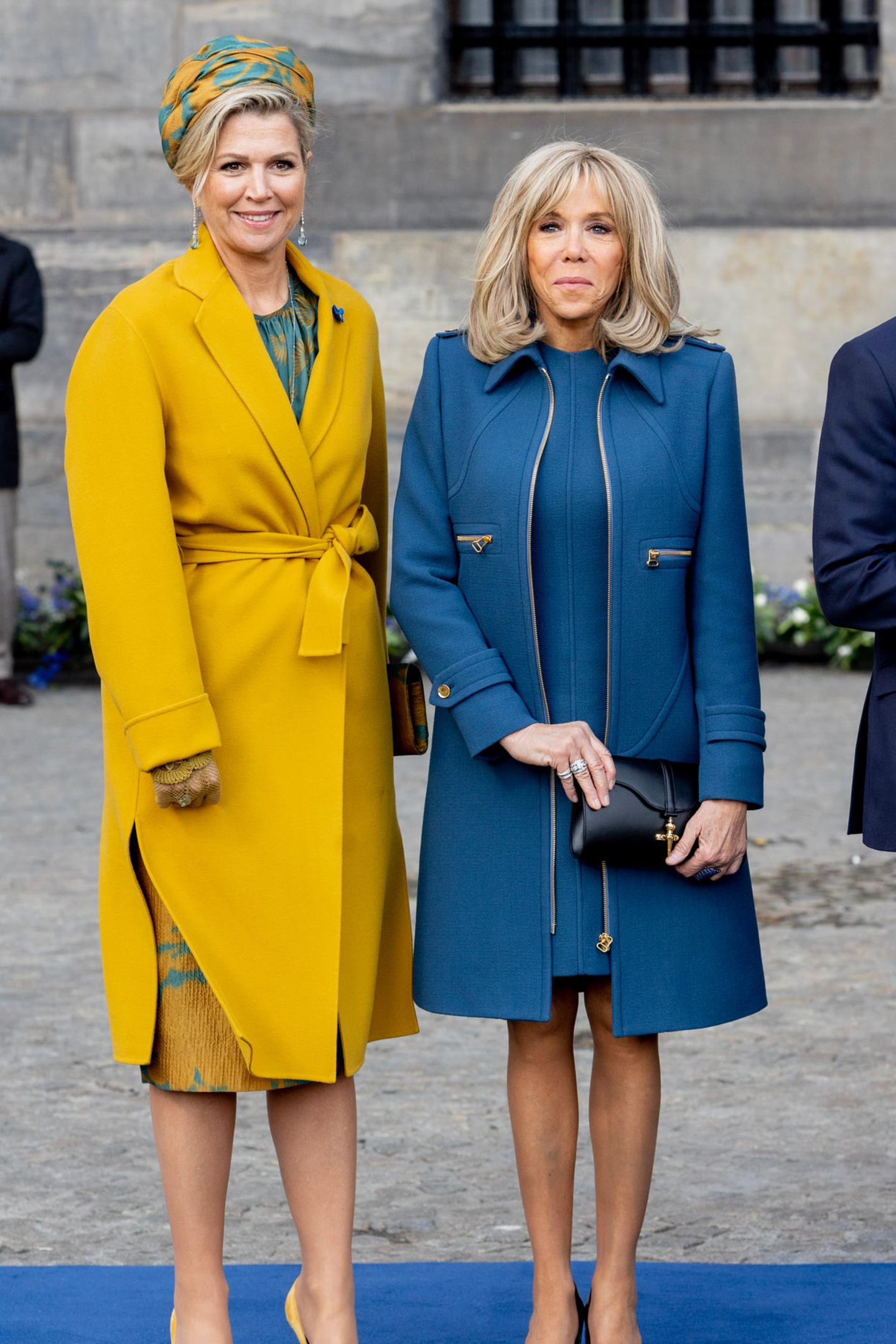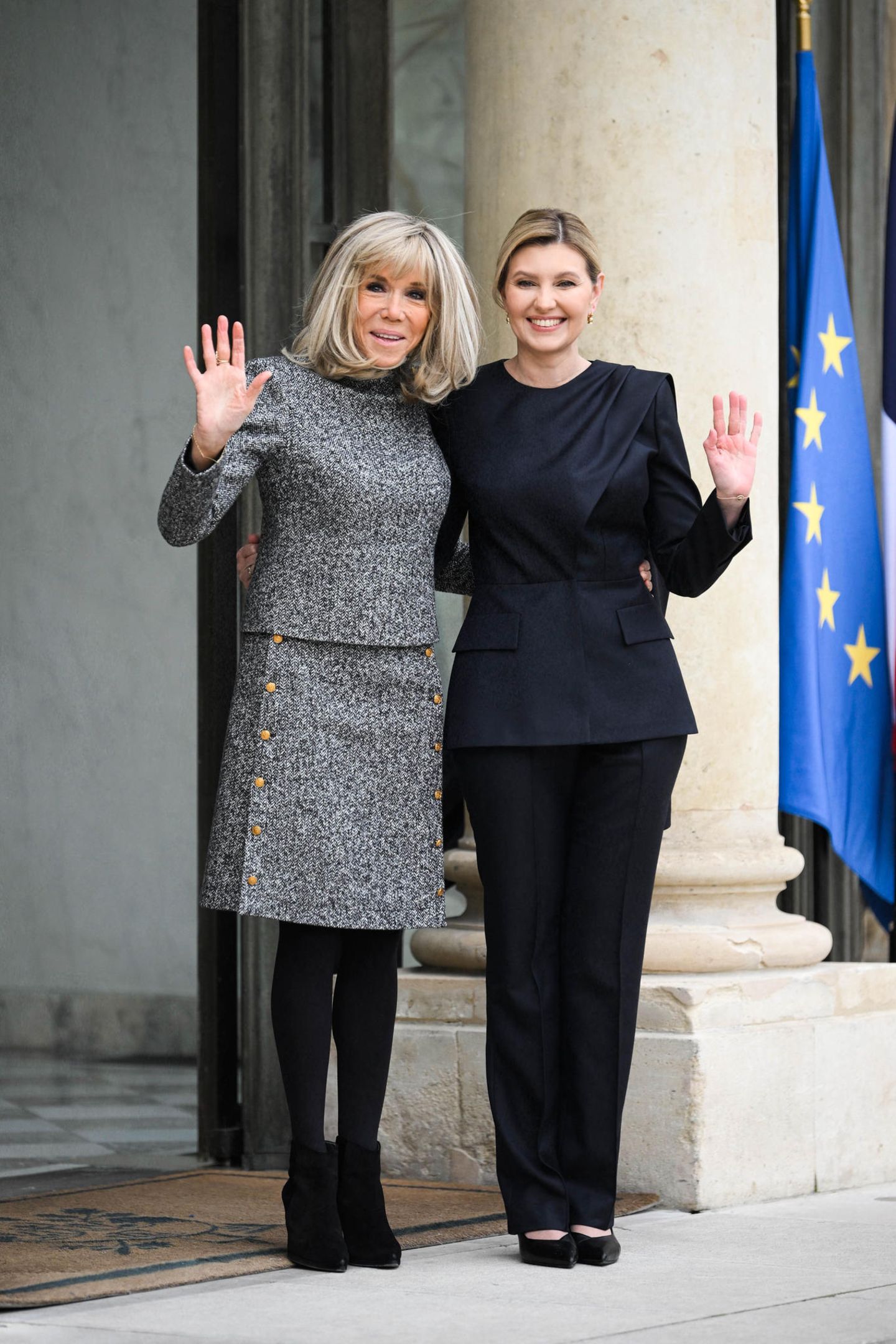People often wonder about the financial standing of public figures, and that includes Brigitte Macron, the wife of French President Emmanuel Macron. It’s a very common thing to be curious about how someone in such a prominent role manages their personal finances, isn't it? This interest, frankly, isn't just about gossip; it's also about transparency and understanding the backgrounds of those in power. Many people, you know, want to feel connected to their leaders, and knowing a bit about their financial story can sometimes help with that.
The idea of a "first lady" often brings with it a certain image, and with that, questions naturally come up about their personal wealth. Is Brigitte Macron rich? That's a question that pops up quite a bit online, and it's something we'll look into today. We’ll try to get a clearer picture of her financial journey, looking at where she came from and what her role means for her personal assets, too.
This discussion isn't just about numbers; it's about context. We'll explore the various aspects that contribute to a public figure's financial narrative, considering everything from family background to their partner's career. So, let's take a closer look at the facts and figures, and try to sort out the reality from the rumors surrounding Brigitte Macron's financial situation, more or less.
Table of Contents
- Who is Brigitte Macron? A Brief Look
- Understanding the Macron Family's Financial Picture
- Sources of Wealth: Unpacking the Details
- Addressing Common Questions About Brigitte Macron's Finances
- The Public's Curiosity: Why Does Brigitte Macron's Wealth Matter?
- Wrapping Up the Discussion
Who is Brigitte Macron? A Brief Look
Brigitte Marie-Claude Macron, born Trogneux, is a very well-known public figure, of course. Before she became France's First Lady, she had a long and rather interesting career, mostly in education. She was a French high school teacher, and that's actually where she met Emmanuel Macron, her future husband, when he was a student. Their story is, you know, quite unique and has certainly captured a lot of attention around the globe.
Her background is rooted in a respected family from Amiens, a city in northern France. This family, the Trogneux, is pretty well-established, particularly in the chocolate and confectionery business. This family connection is, frankly, a key part of understanding her personal history and, in some respects, her early financial environment. It's not every day you hear about a first lady with such a distinct family trade, is it?
She's a mother of three grown children from her first marriage and has seven grandchildren. Her life took a rather significant turn when her husband, Emmanuel Macron, entered the political scene and, eventually, became President of France. This shift brought her into the very bright spotlight of international politics and public scrutiny, which, as a matter of fact, can be quite intense for anyone, let alone someone who spent years as an educator.
Personal Details and Bio Data
| Full Name | Brigitte Marie-Claude Macron (née Trogneux) |
| Date of Birth | April 13, 1953 |
| Place of Birth | Amiens, France |
| Nationality | French |
| Spouse | Emmanuel Macron |
| Children | Sébastien Auzière, Laurence Auzière-Jourdan, Tiphaine Auzière (from first marriage) |
| Occupation Before First Lady | High School Teacher (French, Latin, Theater) |
| Known For | First Lady of France, Former Teacher |
Understanding the Macron Family's Financial Picture
When people ask "is Brigitte Macron rich?", they're often thinking about the combined financial situation of the Macron household. It's important to look at both Brigitte's background and Emmanuel's, as their finances are, naturally, intertwined as a married couple. Their story is a pretty good example of how personal wealth can be built over time, from different sources, too.
Before the Élysée: Brigitte's Early Life and Career
Brigitte Macron comes from a family with a solid financial foundation. The Trogneux family, as mentioned, owns a successful chocolate business that has been around for generations in Amiens. This business, you know, has provided a stable income and, likely, some inherited wealth over the years. While she didn't directly work in the chocolate business herself, being part of such a family means a certain level of financial comfort was probably always there, more or less.
Her career as a teacher also contributed to her personal earnings. For many years, she taught French, Latin, and theater. Teachers, as a rule, earn a steady salary, and over a long career, that can add up. So, she had her own independent income stream for a good part of her adult life, which is a significant detail, isn't it?
It's fair to say that her financial situation before meeting Emmanuel Macron was comfortable, but not necessarily "super rich" in the way some might imagine. It was a picture of professional stability and a background of family prosperity, which, in a way, sets the stage for everything that followed, too.
Emmanuel Macron's Background and Earnings
Emmanuel Macron's financial story also plays a big part in the overall picture. Before he entered politics, he had a very successful career in investment banking. He worked for Rothschild & Cie Banque, which is a pretty prestigious and high-paying field, as a matter of fact. Bankers at that level can earn quite a lot of money, especially when they handle big deals. His time there certainly boosted his personal wealth significantly.
After his banking career, he moved into public service, first as a senior civil servant, then as an economic advisor to President François Hollande, and later as Minister of Economy, Industry and Digital Affairs. These roles, while important, typically pay public servant salaries, which are lower than those in private banking. However, his previous earnings provided a substantial base, you know.
When he became President, his salary became a matter of public record. The President of France receives a set income, which is respectable but not, by any stretch, making him one of the wealthiest individuals in the country. It's a public service salary, and that's, like, a key point to remember, too.
Public Perception and Wealth Declarations
Public figures in France, especially those in high office, are expected to declare their assets. This is done to ensure transparency and to avoid any conflicts of interest. These declarations give the public a glimpse into their financial holdings, though they don't always show the full picture of, say, inherited wealth or family trusts, which can be a bit opaque, frankly.
The Macrons' declarations have shown that they possess assets, including properties, but they haven't indicated an extraordinary level of personal wealth that would put them in the billionaire category, for example. The public perception of "rich" can vary wildly, of course, but based on official statements, their wealth seems to be a result of successful careers and family background rather than, you know, some kind of hidden fortune, more or less.
It's interesting how people perceive wealth, isn't it? Sometimes, just being in a powerful position makes people assume you're incredibly wealthy, even if the official figures tell a somewhat different story. This gap between perception and reality is, arguably, a constant challenge for public figures, too.
Sources of Wealth: Unpacking the Details
To truly answer the question "is Brigitte Macron rich?", we need to look at the different ways wealth can accumulate for a person like her. It's rarely just one big source; it's usually a combination of things over a lifetime. This is, you know, typical for many families who build financial security over generations.
Inheritance and Family Assets
As a member of the Trogneux family, Brigitte Macron likely inherited a portion of the family's assets. The chocolate business, founded in 1872, has been a successful enterprise for a very long time. While specific details of her inheritance are not widely publicized, it's fair to assume that coming from such a family background provides a certain level of financial security and, perhaps, some property holdings, too.
Family businesses, especially ones that have been around for over a century, can generate substantial wealth that passes down through generations. This kind of inherited wealth often includes real estate, investments, and, of course, shares in the family company. It's a quiet, steady accumulation of assets that, in some respects, forms a solid financial base, you know.
This background is a significant factor in her personal financial standing, separate from her husband's career. It means she wasn't starting from scratch, but rather from a position of established family prosperity, which, naturally, makes a difference.
Income Streams and Public Service
Brigitte Macron's own career as a teacher, as we discussed, provided a consistent income for many years. Teachers, while not earning the highest salaries, do build up savings and pension rights over decades of work. This steady income contributed to her personal financial stability before her husband's political rise, which, you know, is pretty important to consider.
As the First Lady, Brigitte Macron does not receive a salary. This is a common arrangement for spouses of heads of state in many countries. However, she does have a budget for her staff and official duties, which is funded by the state. This budget covers expenses related to her public role, but it doesn't go into her personal bank account, which is, like, a key distinction.
Her role as First Lady involves a lot of public appearances and engagements, but these are unpaid duties. So, while she holds a very prominent position, her personal income streams are not directly tied to her current public service role. This is, arguably, a point of confusion for some people who wonder about her wealth, too.
The Role of Transparency in Public Office
Transparency about the finances of public officials is a big deal in France, just like in many other democratic nations. Laws are in place that require ministers, members of parliament, and the president to declare their assets. These declarations are meant to show the public that there are no hidden agendas or illicit gains, and that's, you know, pretty important for trust.
These declarations are made to a body called the High Authority for Transparency in Public Life (HATVP). The HATVP reviews these declarations to ensure everything looks correct and that there are no obvious conflicts of interest. This system is designed to provide a level of accountability, which, as a matter of fact, helps to build confidence in public officials, more or less.
While these declarations offer a snapshot, they don't always detail every single aspect of a person's financial history, especially inherited wealth that might be held in family structures. However, they do provide a baseline for public scrutiny, and that's, like, a vital part of modern governance, too.
Addressing Common Questions About Brigitte Macron's Finances
People often have very specific questions when they look into the wealth of public figures. Here are some common ones related to Brigitte Macron's financial standing, based on what people typically ask online, you know.
Is Brigitte Macron paid as First Lady?
No, Brigitte Macron does not receive a salary for her role as First Lady. In France, the spouse of the President traditionally does not get a direct payment from the state for their duties. She does, however, have a budget allocated for her staff and operational costs related to her official engagements. This budget covers things like assistants, security, and travel expenses for her public duties, but it's not personal income, which is, like, a pretty clear distinction.
What was Brigitte Macron's family business?
Brigitte Macron's family, the Trogneux, owns a very long-established chocolate and confectionery business in Amiens, France. This business, founded in 1872, is well-known in the region for its macarons and other sweet treats. While Brigitte herself pursued a career in teaching, her family's long-standing successful enterprise means she comes from a background of inherited wealth and a solid financial foundation, too. It's a pretty sweet legacy, if you think about it.
Did Brigitte Macron inherit money?
It is widely believed that Brigitte Macron inherited assets from her family, the Trogneux, given their long-standing and successful chocolate business. While the exact figures are not public, it's reasonable to assume that she received a portion of the family's wealth, including potential property and investments. This inherited wealth would contribute to her overall financial picture, separate from her own teaching career or her husband's earnings, too. It's, you know, a common way for wealth to pass down through generations.
The Public's Curiosity: Why Does Brigitte Macron's Wealth Matter?
The public's interest in the finances of figures like Brigitte Macron isn't just about simple curiosity; it often reflects broader societal values and concerns. People want to know about the financial backgrounds of those who represent them, and that's, like, a pretty natural thing. This desire for information, you know, has deep roots in how societies view power and privilege.
Historical Context of Public Figures' Finances
Historically, there has always been a fascination with the wealth of prominent individuals, especially those in leadership roles. Think about it: from ancient kings to modern politicians, people have always wondered about the resources at their disposal. This interest is, in some respects, about understanding influence and, perhaps, even fairness. It's a very old pattern, actually.
It's also interesting to consider how names and public figures evolve in the public mind. For instance, in France, for a long time, the initials "BB" were practically synonymous with Brigitte Bardot, a very famous actress and singer. From 1845 to 1883, "BB" meant Brigitte Bardot, but then it was changed to mean "ball bearing" in 1883, which is, like, a rather curious shift, isn't it? This little historical tidbit shows how public figures capture attention, and how meanings can change over time, even for names like Brigitte, more or less. This constant evolution of public perception, you know, applies to how people view wealth, too.
The transparency around wealth declarations for public figures is a relatively newer development, driven by a desire for accountability. In earlier times, the finances of leaders were often much more opaque. So, the fact that we can even discuss "is Brigitte Macron rich?" with some factual basis is, arguably, a sign of progress in public openness, too.
The Impact of Media and Social Discussion
Today, the media, both traditional and social, plays a huge role in shaping public perception of wealth. A single headline or social media post can spark widespread discussion about a public figure's finances. This immediate and constant flow of information means that questions about wealth, like "is Brigitte Macron rich?", can quickly gain traction, and that's, like, a pretty powerful thing.
The way information is presented can also influence how people interpret it. Sensational headlines, even if not entirely accurate, can create lasting impressions. This makes it even more important for people to seek out reliable sources and to consider the full picture rather than just snippets, you know. It's a bit like trying to piece together a puzzle with only a few pieces.
Ultimately, the public's continued interest in the financial standing of figures like Brigitte Macron reflects a broader societal conversation about wealth, privilege, and the expectations we have for those in public service. It's a conversation that, frankly, is always ongoing, and it helps shape our collective understanding of leadership, too.
Wrapping Up the Discussion
So, when we look at the question, "is Brigitte Macron rich?", the answer is, arguably, nuanced. She comes from a family with a very solid financial background, thanks to a long-standing and successful business. Her own career as a teacher also provided a steady income for many years. Her husband, Emmanuel Macron, had a highly lucrative career in banking before entering public service, which certainly added to their combined assets. It's, you know, a story of combined professional success and inherited family wealth.
While she doesn't receive a salary as First Lady, her role comes with state-funded support for her official duties. The Macron family's assets are publicly declared, showing a comfortable financial situation consistent with their professional backgrounds, but not, you know, the kind of extreme wealth some might imagine. Their financial standing appears to be a result of legitimate careers and family legacy, which, frankly, is pretty straightforward.
Understanding the financial picture of public figures helps us appreciate the full scope of their lives and influences. It's a way to connect with the people who hold important positions, and to see how their personal histories intersect with their public roles. To learn more about public figures and their roles, you can explore other articles on our site. And if you're curious about the financial aspects of political life, you might also find this page interesting: . You can also find more information on official French government transparency websites, which provide public declarations of assets for officials, for example, at a reputable financial news source like [EXTERNAL_LINK_PLACEHOLDER].
Related Resources:
Detail Author:
- Name : Brooks Pacocha
- Username : schoen.heath
- Email : nolan.jamir@gmail.com
- Birthdate : 1970-05-06
- Address : 62707 Dasia Meadow Suite 382 Dangeloside, WA 14315
- Phone : (757) 534-4014
- Company : Collins, DuBuque and Ziemann
- Job : Tax Examiner
- Bio : Odit in reprehenderit sint similique. Et adipisci esse officiis non autem provident nam. Voluptatibus hic voluptatem error perspiciatis quia. Non praesentium facilis alias aut.
Socials
tiktok:
- url : https://tiktok.com/@charlie1229
- username : charlie1229
- bio : Distinctio laborum molestiae error magnam eum.
- followers : 4132
- following : 2149
twitter:
- url : https://twitter.com/jacobi2000
- username : jacobi2000
- bio : Iure quis voluptas expedita vel quis vitae. Qui earum eos quasi voluptatem magni explicabo. Ex at qui non minus ut aut eveniet.
- followers : 113
- following : 2184


